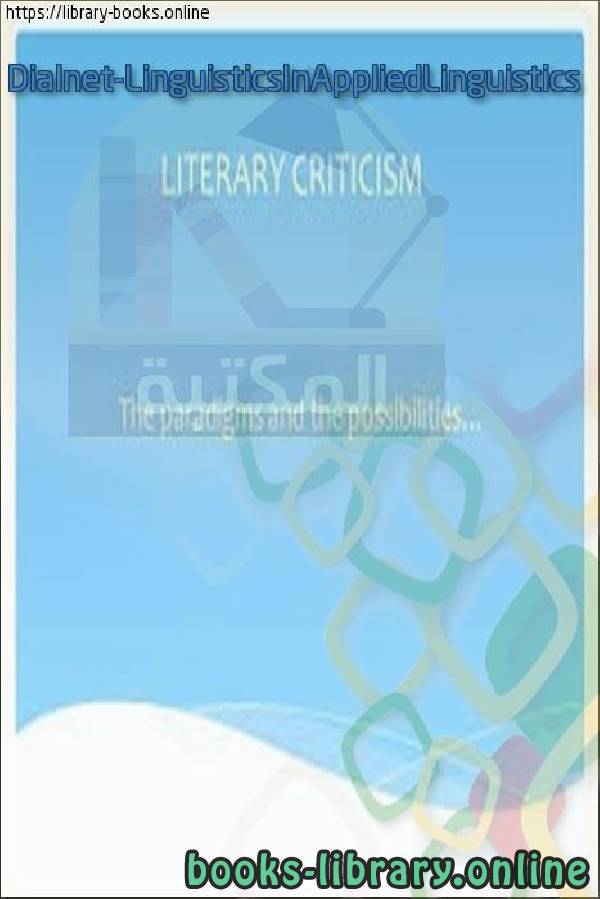📘 قراءة كتاب Dialnet-LinguisticsInAppliedLinguistics أونلاين


هذا القسم يحتوي علي مصادر خاصة بعلم الأصوات.
هو فرعٌ من فروع اللسانيات "أي علم اللغة"، وهذا الفرعُ يعنى بتطبيق النظريات اللغوية ومعالجة المشكلات المتعلقة باكتساب اللغة الأولى والثانية وتعليمها. كما يعنى هذا الحقل بالتحليل التقابلي بين اللغات للاستفادة منه في تحسين ظروف تعلم اللغات وتدريسها. تأثر هذا الحقل من اللسانيات بنظريات العالم اللغوي الأمريكي المعروف "ناعوم تشومسكي"، وخاصة نظرية النحو الكلي "Universal Grammar" والتي تفسر قدرة الإنسان على اكتساب أي لغة بشرية بغض النظر عن عرقه أو لونه أو معتقده أو ديانته، ومن ثم محاولة توظيف هذه النظرية في سبيل الوصول إلى فهم أكثر لعملية الاكتساب اللغوي. ويعد عقد التسعينيات من القرن العشرين هو عقد ازدهار حقل اللسانيات التطبيقية، حيث أصبح بعض الشيء حقلاً مستقلاً عن اللسانيات النظرية "Theoretical Linguistics" وأصبحت العديد من الجامعات تقدم برامج للدراسات العليا المتخصصة باللسانيات التطبيقية كما أصبح هناك العديد من المراكز والمنظمات التي تعنى بهذا الحقل كالجمعية الأمريكية للسانيات التطبيقية، ومركز اللسانيات التطبيقية بالولايات المتحدة وغيرها من المنظمات بأمريكا والمملكة المتحدة.
حقل اللسانيات التطبيقية يتقاطع مع فروع أخرى للمعرفة ومن هذه الفروع بالإضافة إلى اللسانيات، هناك علم الإنسان "Anthropology" وعلم النفس "Psychology" والتربية والتعليم "Education" وكذلك علم الإدراك "The Cognitive Science" ويحاول توظيف كل ما تنتجه فروع المعرفة هذه لصالح تعلم اللغات واكتسابها بين البشر.
Applied linguistics is an interdisciplinary field which identifies, investigates, and offers solutions to language-related real-life problems. Some of the academic fields related to applied linguistics are education, psychology, communication research, anthropology, and sociology.
contents
1 Domain
2 Journals
3 History
4 Associations
4.1 Australia
4.2 Canada
4.3 Ireland
4.4 Japan
4.5 New Zealand
4.6 South Africa
4.7 United Kingdom
4.8 United States
Domain
Applied linguistics is an interdisciplinary field. Major branches of applied linguistics include bilingualism and multilingualism, conversation analysis, contrastive linguistics, sign linguistics, language assessment, literacies, discourse analysis, language pedagogy, second language acquisition, language planning and policy, interlinguistics, stylistics, language teacher education, pragmatics, forensic linguistics and translation.
Journals
Major journals of the field include Annual Review of Applied Linguistics, Applied Linguistics, Journal of Applied Linguistics, International Review of Applied Linguistics, International Journal of Applied Linguistics, European Journal of Applied Linguistics, Issues in Applied Linguistics, Language Learning, Language and Education, TESOL Quarterly, and Linguistics and Education.
History
The tradition of applied linguistics established itself in part as a response to the narrowing of focus in linguistics with the advent in the late 1950s of generative linguistics, and has always maintained a socially-accountable role, demonstrated by its central interest in language problems.[1]
Although the field of applied linguistics started from Europe and the United States, the field rapidly flourished in the international context.
Applied linguistics first concerned itself with principles and practices on the basis of linguistics. In the early days, applied linguistics was thought as “linguistics-applied” at least from the outside of the field. In the 1960s, however, applied linguistics was expanded to include language assessment, language policy, and second language acquisition. As early as the 1970s, applied linguistics became a problem-driven field rather than theoretical linguistics, including the solution of language-related problems in the real world. By the 1990s, applied linguistics had broadened including critical studies and multilingualism. Research in applied linguistics was shifted to "the theoretical and empirical investigation of real world problems in which language is a central issue."[2]
In the United States, applied linguistics also began narrowly as the application of insights from structural linguistics—first to the teaching of English in schools and subsequently to second and foreign language teaching. The linguistics applied approach to language teaching was promulgated most strenuously by Leonard Bloomfield, who developed the foundation for the Army Specialized Training Program, and by Charles C. Fries, who established the English Language Institute (ELI) at the University of Michigan in 1941. In 1946, Applied linguistics became a recognized field of studies in the aforementioned university.[3] In 1948, the Research Club at Michigan established Language Learning: A Journal of Applied Linguistics, the first journal to bear the term applied linguistics. In the late 1960s, applied linguistics began to establish its own identity as an interdisciplinary field of linguistics concerned with real-world language issues. The new identity was solidified by the creation of the American Association for Applied Linguistics in 1977.
applied traduction
applied synonym
applied quebec
applied catalogue
applied baie-comeau
applied canada
applied medical
applied linguistics pdf
applied linguistics summary pdf
theoretical and applied linguistics pdf
applied linguistics for ba students in english pdf
applied linguistics courses
applied linguistics essay
linguistics
linguistics lessons
types of linguistics
what is linguistics pdf
purpose of linguistics
why study linguistics?
branches of linguistics
modern linguistics summary
characteristics of linguistics
applied linguistics and language teaching pdf
applied linguistics slideshare
history of applied linguistics
سنة النشر : 2016م / 1437هـ .
حجم الكتاب عند التحميل : 0.1MB .
نوع الكتاب : pdf.
عداد القراءة:
اذا اعجبك الكتاب فضلاً اضغط على أعجبني و يمكنك تحميله من هنا:

شكرًا لمساهمتكم
شكراً لمساهمتكم معنا في الإرتقاء بمستوى المكتبة ، يمكنكم االتبليغ عن اخطاء او سوء اختيار للكتب وتصنيفها ومحتواها ، أو كتاب يُمنع نشره ، او محمي بحقوق طبع ونشر ، فضلاً قم بالتبليغ عن الكتاب المُخالف:
 قبل تحميل الكتاب ..
قبل تحميل الكتاب ..
يجب ان يتوفر لديكم برنامج تشغيل وقراءة ملفات pdf
يمكن تحميلة من هنا 'http://get.adobe.com/reader/'


 منصّة المكتبة
منصّة المكتبة 